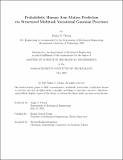Probabilistic Human Arm Motion Prediction via Structured Multitask Variational Gaussian Processes
Author(s)
Chong, Jinger S.
DownloadThesis PDF (3.906Mb)
Advisor
Youcef-Toumi, Kamal
Terms of use
Metadata
Show full item recordAbstract
Accurate human motion prediction with uncertainty estimation is essential for safe and efficient human-robot collaboration, where robots must anticipate and react to human movements in real-time. Existing methods either rely on sophisticated techniques that demand extensive training data and sacrifice interpretability, or use simpler approaches like conventional Gaussian Processes (GPs) that fall short in performance. To address this gap, we propose a novel structured multitask variational GP framework that explicitly incorporates joint dependencies to reflect human kinematics. We further enhance this framework by integrating angular velocity constraints, which improve the physical plausibility of predictions. The addition of constraints alone yields up to a 66% reduction in mean angle error (MAE) and an 84% improvement in the likelihood of predicting ground truth (NLL), outperforming standard GP baselines across a wide range of motion types and prediction horizons. Among model variants, our structured GP with constraints offers the best tradeoff—achieving MAE within 1.1–2.6% and NLL within 0.001–0.012 of the best-performing model, while maintaining significantly lower overconfidence rates (OCR), particularly at short horizons where the independent GP model OCR reaches nearly 45%. These results underscore the importance of incorporating structure and context in human motion prediction, demonstrating that even simpler probabilistic models like GPs can achieve substantial performance gains when augmented with such information.
Date issued
2025-05Department
Massachusetts Institute of Technology. Department of Mechanical EngineeringPublisher
Massachusetts Institute of Technology